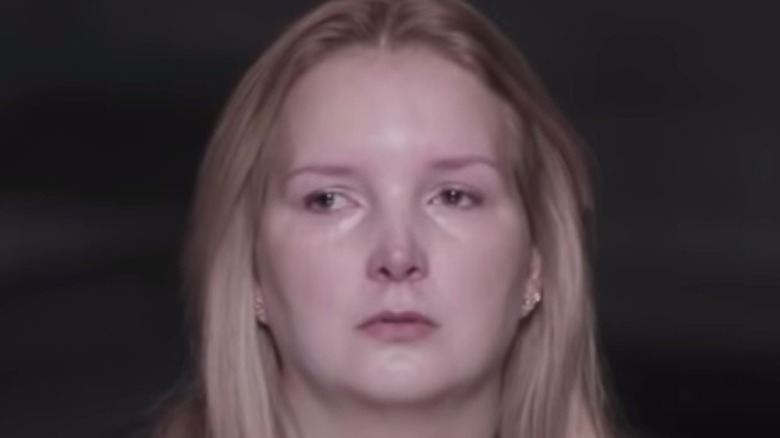What Netflix's Once Upon A Crime Didn't Tell You
It is not often that a true crime series will feature an exclusive interview with a killer — especially one who is still behind bars, and not even halfway into a 19-year sentence. Perhaps that's why Netflix's new docuseries, "Elize Matsunaga: Once Upon A Crime," has managed to generate so much buzz.
In 2012, the wealthy businessman Marcos Kitano Matsunaga was reported missing from his home in São Paulo, Brazil, by his wife, Elize. His dismembered body was later found scattered around the local area, his body parts wrapped in trash bags. Matsunaga had been shot through the head, and his throat had been cut. And, as the docuseries makes immediately clear, it was Elize who was responsible. In the years that followed, the slaying of Matsunaga became one of Brazil's most sensationalized and debated cases — particularly Elize's murder trial.
As the docuseries shows, Elize first met her late husband while she was working for an escort service, with the businessman leaving his first wife for her after months of infidelity. In her interview, Elize explains that it was Matsunaga's cheating ways and mistreatment of her — which, she argues, amounted to psychological and emotional abuse — that led to her getting her gun and killing him in a crime of passion.
If you or someone you know is dealing with domestic abuse, you can call the National Domestic Violence Hotline at 1−800−799−7233. You can also find more information, resources, and support at their website.
The moral case for Once Upon A Crime
It is no wonder that "Elize Matsunaga: Once Upon A Crime" has attracted plenty of plaudits from TV critics and true crime aficionados, with Elize breaking her silence for the first time since her imprisonment in 2016. "I still don't know how to explain what kind of emotion made me pull that trigger," she says in the documentary, shining new light into a case that in 2012 captivated the Brazilian public and has remained in the nation's popular consciousness for almost a decade. Not only that, but the documentary offers an unprecedented insight into the mind of a convicted killer whose guilt is never in doubt, and who looks back on the tragic circumstances and emotional turmoil that led to an otherwise unassuming woman to commit such heinous acts of violence.
Director Eliza Capai — who has made a name for herself as a socially-conscious filmmaker and whose latest short film, "Your Turn," was a double prizewinner at the 69th Berlin International Film Festival in 2019. "I felt a great moral responsibility to direct this series," she said (per the Radio Times). "Not only for Marcos' family and friends who suffered with this tragedy, but also for Elize's family, people who knew nothing about it but also suffer the consequences until this day."
"Once Upon A Crime's" extended interviews with Elize give the series the feeling of a confessional; that the killer is being honest about their crimes. However, not everyone is convinced.
Perceived bias in Once Upon A Crime
The set-piece that has ensured "Elize Matsunaga: Once Upon A Crime" turns heads is, of course, the interview with Elize herself, which took place in 2019 during an unsupervised furlough from her prison sentence — a right all Brazilian prisoners have, according to The Independent. In her interview, Elize discusses her marriage, the killing, and how the traumas of her childhood and early life contributed to her eventual killing of her husband Marcos Kitano Matsunaga.
But though unprecedented access to the killer promises to offer such insights into the crime in question that very few docuseries have ever given before, the approach makes the final product highly suspect. As discussed at length by Daily Beast critic Nick Schager, "Once Upon A Crime" is constructed in such a way that we the audience are invited to take Eliza's testimony at face value: the show is "on the side of Elize," despite the fact that she had previously tried to cover up the crime and that the version of events as told by Elize remains self-contradictory.
The final episode of "Once Upon A Crime" makes plain that it is attempting to paint Eliza as the real victim, despite the horrifying nature of her crimes and the fact that a young man — as awful a husband as he allegedly was — was brutally murdered. Schager argues that the series effectively absolves the killer of blame, and thus, in light of court findings, is fundamentally flawed in its approach.


